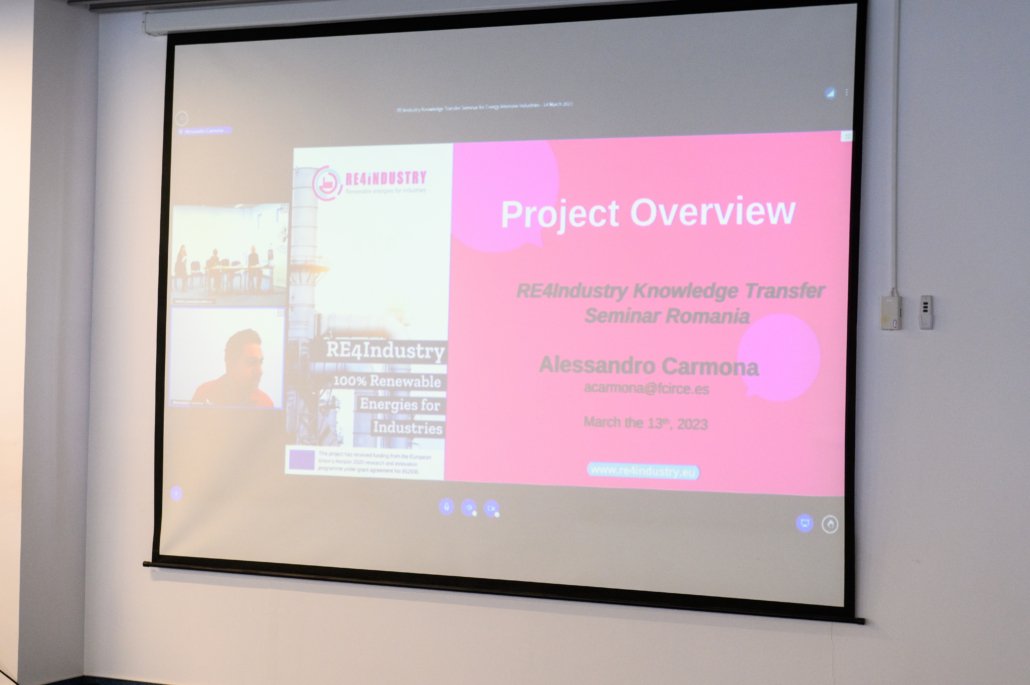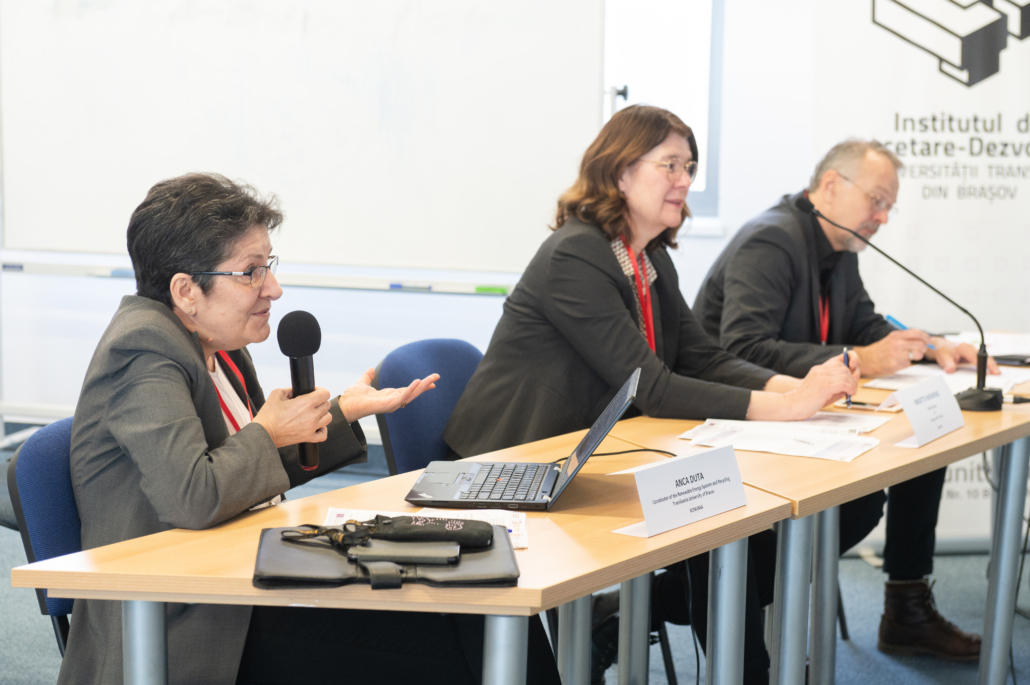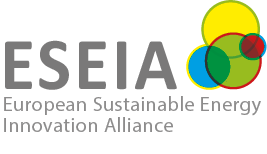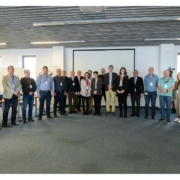RE4Industry Knowledge Transfer Seminar Romania: Key Takeaways
On 14 March 2023, the third RE4Industry Knowledge Transfer Seminar was held in Brasov, Romania, bringing together 58 participants (43 onsite and 15 online) for a day of insightful presentations and thought-provoking discussions on energy transition in energy-intensive industries (EIIs).
It is no secret that decarbonising EIIs such as steel, cement, chemicals and more, which contribute significantly to greenhouse gas emissions, is critical to meeting the EU’s ambitious climate targets while strengthening its competitiveness.
With the current decade being decisive in tackling climate change, EIIs have a once-in-a-generation opportunity to embrace innovation and invest in net-zero technologies and sustainable solutions. Held 14 March 2023 in Brasov, Romania, the third RE4Industry Knowledge Transfer Seminar aimed to address the challenges and opportunities of the energy transition in EIIs.
Organised by ESEIA in cooperation with the Transilvania University of Brasov in the framework of the Horizon 2020-funded project RE4Industry, the event brought together experts from academia and industry who reaffirmed the need to accelerate the shift from fossil fuels towards 100% renewable energy solutions in EIIs. Here are the key takeaways.
Renewable power and heat for EIIs
The EU industry includes multiple sectors that still rely on fossil fuel-based electricity and heat for their production processes and emit some 500 million tons of CO2 per year. However, several measures can be implemented to shift away from fossil fuels and reduce emissions.
One of the goals of the RE4Industry project is to assess the most promising technologies for renewable electricity (wind, solar photovoltaic, and hydropower) and heat (solar thermal, heat pumps, geothermal energy, green hydrogen, and bioenergy) production in EIIs. As the RE4Industry Project Coordinator Alessandro Carmona explained, while the first category is well-known and implemented for renewable power production, the second category has limited implementation in EIIs, despite the potential to supply a broad range of temperatures needed for multiple processes.

“Hydrogen can be a promising alternative to fossil fuels both for small-scale and large-scale applications,” said the Researcher at the Department of Product Design, Mechatronics and Environment of Transilvania University of Brasov Maria Covei. But, to be considered “a green fuel, hydrogen should be obtained using renewable energy sources.”
Currently, the production of green hydrogen is limited but is expected to grow in the coming years due to its potential for material use (in the chemical and refinery industries) or in production processes to avoid emissions (in the steel industry). “I believe green hydrogen will be an important part of the future more sustainable energy system,” observed the Managing Director Projects at WIP Renewable Energies Rainer Janssen.
Biomass, on the other hand, seems to be a key element in the decarbonisation of EIIs. “More and more EIIs are looking into biomass and bioenergy. Why? Because it is a mature solution, it is available today and often cost-effective compared to fossil fuel alternatives,” noted the Business Development & Membership Director at Bioenergy Europe Manolis Karampinis.
ArcelorMittal, a leading steel and mining company, is one of the success cases identified and studied in the framework of the RE4Industry project and can be used as an example of biomass use in EIIs. According to the Senior Research Associate at CERTH Myrto Zeneli, the company is taking various steps to become carbon-neutral by 2050. One such step is the Torero project based in Ghent, Belgium, which aims to produce torrefied biomass and use it to replace pulverised coal in a steel mill blast furnace.
Biomass currently serves a dual purpose: fuel for heat production in the paper and silicon industries and feedstock for other types of biofuels. An issue regarding its future use in EIIs depends on several factors, such as policy, market developments, and the specificities of each industrial case.
In addition to an overview of multiple renewable technologies that are or will become available in the coming years to support the energy transition of EIIs in the EU, an interesting point was raised by the Associate Project Manager at White Research Nina Louvrou: societal acceptance of these technologies. She noted that societal acceptance of renewable energy sources is an important issue in the deployment of energy projects and especially in the context of sustainable energy transformations.
White Research, the RE4Industry Consortium partner, conducted a survey to assess public perceptions of biomethane and hydrogen in three European countries, including Greece. According to the results shared by Nina Louvrou, “population in Greece is positively predisposed towards the use of biomethane and hydrogen. The vast majority believe that both solutions can contribute to the environment, the society, and the economy.” Furthermore, the survey revealed that the key factors affecting perceptions and acceptability are benefits, trust, costs and risks.

Green energy initiatives in Romania’s industrial landscape
In Romania, most of the demand for energy in industry is met through the direct use of fossil fuels and electricity. In fact, natural gas and electricity are the top energy carriers, with more than two-thirds of the final energy consumption in the industry. While renewable energy sources are gaining popularity, their direct use in industrial processes and facilities remains relatively low (3%). There are, however, exceptions.
For companies such as Menatwork, a Romanian construction materials and solutions provider, solar is the go-to renewable energy source. The installed PV system generates around 600 MWh/year, 14% of the required electrical energy for the company’s industrial processes, explained the Researcher at the Department of Product Design, Mechatronics and Environment of Transilvania University of Brasov Bogdan Gabriel Burduhos.
For a more detailed overview of sustainable solutions and practices in local communities in Romania, the Biovill Map is a great tool. The interactive map, developed by the Green Energy Cluster in cooperation with the Department for Sustainable Development, shows which sustainable communities secure their energy from local renewable sources such as biomass.
Sustainability is also at the heart of Transilvania University of Brașov, the largest university in the centre of Romania, which offers study programmes in 43 domains, including renewable energy. As Professor at Transilvania University of Brașov and ESEIA Honorary Vice-President Ion Visa explained, the university aims to strengthen the interaction between the institution and society through its bachelor’s, master’s, and doctoral degrees, as well as secondary education and training projects. Everyone – pupils, students, adults – must be involved in promoting sustainable development, he said.
In conclusion, when it comes to developing and implementing renewable energy technologies and sustainable solutions, it is clear that a multidisciplinary and multi-actor approach across the entire value chain is needed. Recognising the interdependence between energy, society, and the environment is essential to creating a more sustainable future.
As the Programme Director at Brasov Metropolitan Agency for Sustainable Development Catalin Frangulea summed up, events such as the RE4Industry Knowledge Transfer Seminar Series are “those small particles that form a larger chain reaction that will give the answer to the energy needs of the future.”
Thank you to the Transilvania University of Brasov and the team led by Professor Anca Duta for hosting such a successful event and to the speakers, moderators, partners and participants for their time, expertise and commitment to promoting sustainable development and shaping the future of the industrial sector in the EU!

Next (and final) stop: Croatia
On 13 June 2023, we will, once again, bring research and industry closer to keep exploring how to achieve full decarbonisation of EIIs. The fourth and final RE4Industry Knowledge Transfer Seminar will take place in Zagreb, Croatia, hosted by the University of Zagreb, Faculty of Mechanical Engineering and Naval Architecture. More information will follow soon. Stay tuned!
Contact:
ESEIA Team: office@eseia.eu


